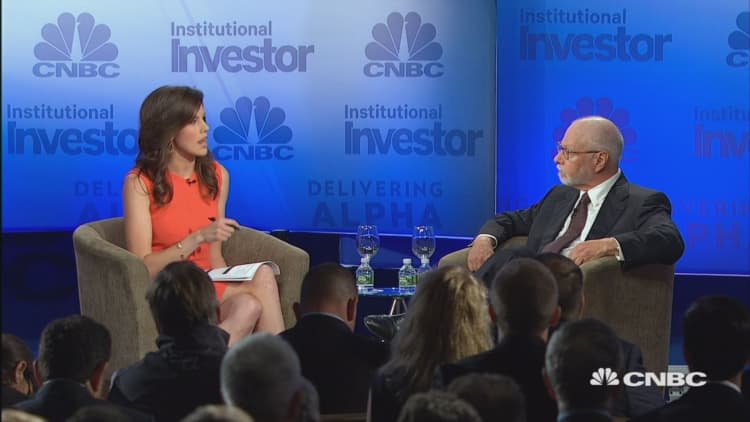
Paul Singer is once again putting global policymakers on notice.
The billionaire founder of investment firm Elliott Management was one of several investors who warned financial ministers in 2007 that a crack in the housing market could cause huge problems for the banking industry.
He is now cautioning that it is once again "a very dangerous time" in global markets.
The financial system is still too leveraged, from his point of view, given the vast amounts of interest-rate derivatives outstanding (roughly $700 trillion) at a time when rates are at "5,000-year lows." The extreme intervention of central banks directly into financial markets has pushed many bond rates to "zero or weirdly below," while creating "a tremendous increase in hidden risk," Singer said at CNBC/Institutional Investor's Delivering Alpha conference on Sept. 13.
"The term 'safe haven' applied to G-7 bonds is just wrong," he said. "These are not safe havens. In fact, there's a tremendous amount of risk in owning 10- and 20- and 30-year bonds at these rates."
He also cautioned that if bond and stock prices continue to fall simultaneously, as they have on occasion in recent weeks, that "not only would put quite a dent in a number of institutional portfolios." It also could hit leveraged strategies known as "risk parity" that are run by some major hedge funds.
"If that is triggered, I think central banks are in a tough place. And I think governments are in a tough place," Singer said.
Singer defended the intervention of the Federal Reserve and other central banks in the "immediate aftermath" of the 2008-09 financial crisis, saying "policy [then] was appropriate." But central bank policies since, from zero-percent rates to bond and equity-buying programs to talk of even "helicopter money … to fund infrastructure spending" have "been strongly growth-suppressive," Singer argued.
"I think the incentives have been against normal [bank] lending, against entrepreneurship growth, and towards financial suppression," he said.
Singer would prefer to see fiscal policies step up to stimulate growth in ways that monetary policy no longer can — even if that means explicit coordination between, say, the Fed and the White House or Congress.
"Officials around the globe are not picking up the ball," he said. "A further result of all this is to exacerbate inequality and to create the conditions for social restiveness."
"You can't just raise interest rates without doing something else," he said. "Do it simultaneous with tax, regulatory" and other structural pro-growth overhauls.
"I think central bank independence is overrated," Singer said. "I'm not saying immediately start legislation to put central banks under the thumb of governments, because we know the danger of that. But … that's what they're planning to do anyway, meaning, printing money, debasing the currency."
That debasement is why Singer expects that "at some point, perhaps soon … inflation may blow through these targets and surprise everyone."
All of which is not to say he expects another severe market crash. "There will be no credit collapse, in my view," he added, expecting that policymakers would ultimately ward off something like that. "But there are plenty of historical episodes where inflation, serious inflation, coexists with poor economic conditions."
"Sell your 30-year bonds," he warned the audience. "Sell long-term bonds is my outright recommendation."


